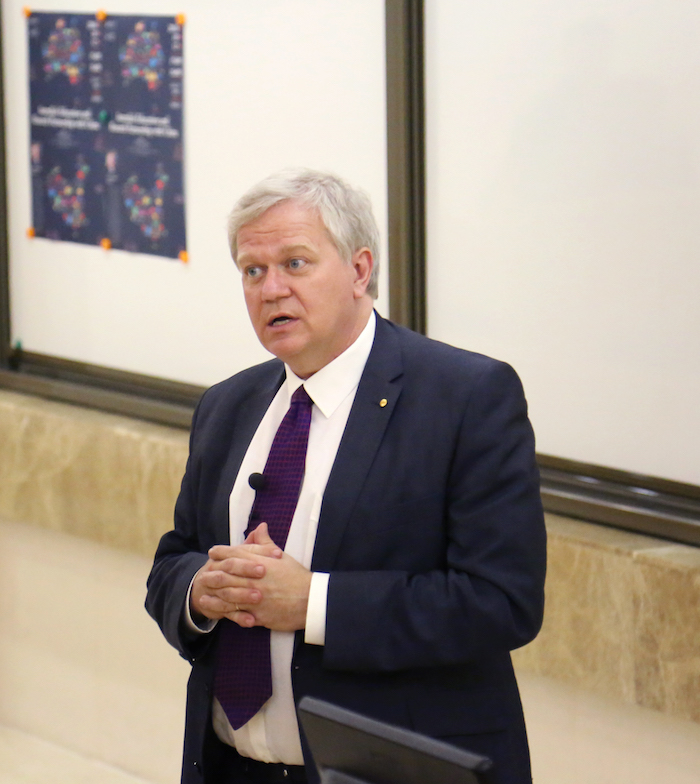On October 12, 2016, a delegation led by Professor Brian P. Schmidt, Vice-Chancellor of the Australian National University (ANU) visited Peking University. They were received by a delegation led by President of PKU Lin Jianhua at Linhuxuan.
During the meeting, the two delegations exchanged views on the double Ph.D. collaboration program and expressed their hope for greater cooperation and resource pooling. With regards to each side’s future plans and focus, Professor Schmidt paid special attention to the development of high quality research and new findings that pushed hard issues. He states this could be achieved because, “ANU is small and unique; it aims to let students learn differently”. On the other hand, President Lin Jianhua mentioned plans in regards to the development to the PKU Shenzhen Graduate School and the construction of a new campus in Haining, Zhejiang Province.
The two delegations also held discussions on government influence on university development, the tough standards of the international committee as well as the increasing portion of PKU exchange students abroad. Further discussed were the university professors’ teaching and research skills. Professor Schmidt raised a question about undergraduate selection, to which President Lin explained that it currently depends mostly on the “Gaokao” (college entrance examination in China) and partially, through interviews to choose prospective students. He stressed that through educational reforms, the methods of selection will be diversified.

After the meeting, Professor Schmidt gave a lecture on the topic of “Australia’s Education and Research Partnership with China” at the No. 2 Gymnasium in PKU. In his lecture, Professor Schmidt underlined the effects of collaborations between universities on international cooperation, and he shared his story of how he became a professor and then ultimately a Nobel Prize recipient.
In the beginning of his remarks, Professor Schmidt looked back on past communications between China and Australia, and he pointed out that the relationship has further developed to unprecedented heights. Professor Schmidt also mentioned that the China-Australia Free Trade Agreement (ChAFTA) promotes mutual prosperity. Additionally, The Professor highlighted the China Center for Economic Research (CCER’s) successful academic research and international institution relationships, and he said he is looking forward to more cooperation opportunities, especially in the fields of humanity and social sciences.
Schmidt gave some advice to the students. He suggested the students take risks. He emphasized this point by sharing his own experience of a risky but finally successful project to encourage students to find the few but precious opportunities.
Professor Schmidt went on to share his proposition that China and Australia should enhance their relationship through businesses, forums, and cultural understandings. First, he stated that the previous mutual transactions and communications benefited both China and Australia. Then he went on to applaud the Chinese achievements in manufacturing which enabled many poverty-stricken people to afford daily commodities. Finally, he pointed out that it was essential to keep pace with the times in a fast-changing world through better research and education.

Noting the fact there are a growing number of Chinese students at ANU, he welcomed Chinese faculty and students to work together to build a better and more unique ANU, with the ultimate goal of creating a unique international environment to provide truly useful knowledge. He suggested that China and Australia should establish a connection in the expertise of history, media, regional studies, and social sciences with regards joint-Ph.D. programs.
In conclusion, by sharing his unexpected and interesting encounter with his wife, Professor Schmidt stressed the significance of broad networks and the interflow of talents. He pointed out that what made a difference was the quality, not the quantity of a universities. He expressed his hope to further the stable relationship between China and Australia and to settle pressing global issues such climate change, in order to contribute to a better world.
Written by: Fu Fenju
Edited by: Dohun Na
Photos by: Liu Yueling



